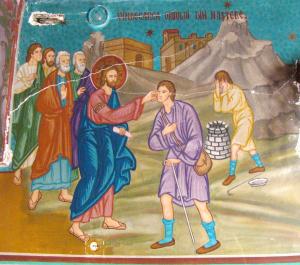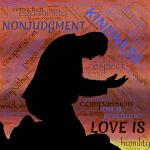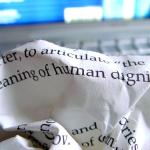
When we see someone who is truly down and out, such as some homeless man or woman living on the streets, we try to figure out what happened to them. What has led them to being in such a bad position? Was it something they did? Was it something others did to them? Who, exactly, is responsible? Some will try to blame the man or woman whom they see, others will blame society. Perhaps, in some situations, both claims will have some validity, but we must not use particular cases to make for universal claims. Sometimes neither the person, nor society, is at fault, but rather, circumstances which are outside of anyone’s control leads someone to being in such a bad position. For example, what could make someone homeless? While, it is possible they did not pay their bills, another possibility is that some natural disaster such as a tornado, an earthquake, or a hurricane, recently destroyed their home and they have no place to go. And so, while no one is culpable for what happened to them, society still has a role in determining what happens next, and if it does not find a way to help them, or any other homeless person, society certainly will certainly be held culpable for not dealing with the situation properly. Also, what happens after we meet someone who has becomes homeless, whether or not we help them, in whatever capacity we have to help them, will be on us. We are expected to help people in need. Certainly, we might not be able to do much; we might not have money to give, and people might not listen to us if we challenge society to find a way to help them, but we must admit, even a few words of encouragement, a loving gesture which looks at the person as a person and not as an object to be scorned or even pitied, will give them some of the consolation and support they need to continue to push on to another day. And, of course, we can and should include them in our prayers, recognizing, of course, that if we can do more than pray, we should. Nonetheless, it is normal for us to try to understand how a person got into such a situation; we must not do so as a way to excuse ourselves, or society, from doing what we can to help the person; we must not try to find excuses to ignore them, their needs, indeed, excuses to disregard their plight. We should first focus on those needs, and then, in the process of helping them, determine the rest, if we can, realizing, though, sometimes a person is suffering because of no single fault which can be placed upon anyone. This is one of the messages we can get with Jesus’ encounter with a man who was born blind:
As he passed by, he saw a man blind from his birth. And his disciples asked him, “Rabbi, who sinned, this man or his parents, that he was born blind?” Jesus answered, “It was not that this man sinned, or his parents, but that the works of God might be made manifest in him. We must work the works of him who sent me, while it is day; night comes, when no one can work. As long as I am in the world, I am the light of the world.” (Jn. 9: 1-5 RSV).
Why was the man born blind? No one, not even God, is responsible. He was born blind due to the laws of nature. It was some natural defect. It could have been the result of some genetic defect, or it could be some environmental circumstance which disrupted his fetal development. While no one was to blame for his condition, society was responsible for how they treated him. Of course, this is true, not just for this particular blind man, but for all kinds of people born with natural defects, as well as people who, through no fault of their own, find their body suffers from some sort of malady which incapacitates them. It is also true for the homeless man or woman who no longer is able to overcome their debilitating situation. If we ignore them, if we push them aside, if we treat them as worthless people because of the situation they find themselves in, we will be blamed for how we mistreat them. If we do not make restitution for our actions, we will be judged and find ourselves facing the consequences of our actions. Whenever there is someone in need, the work of God should be made manifest by helping them. We should become the hands of God in their lives, at least, insofar as we can. We should show them compassion, and indeed, love, so that whatever darkness clouds their life can be lifted by such care. If we do this, then the glory of God can be made manifest in and through our work. If we are unwilling to do so, we should not be surprised if the light of grace seems to be snuffed out of the world, leading people to doubt either God’s existence or goodness. We will have ourselves to blame for that. Paul and Silas understood this, which is why, though they were imprisoned, they showed mercy to their jailer, a mercy which revealed to him the grace of God, leading him to listen to and believe in what Paul and Silas had to say:
But about midnight Paul and Silas were praying and singing hymns to God, and the prisoners were listening to them, and suddenly there was a great earthquake, so that the foundations of the prison were shaken; and immediately all the doors were opened and every one’s fetters were unfastened. When the jailer woke and saw that the prison doors were open, he drew his sword and was about to kill himself, supposing that the prisoners had escaped. But Paul cried with a loud voice, “Do not harm yourself, for we are all here.” (Acts 16:25-28 RSV).
Some people might say the jailer is to blame for the situation he found himself in. He willingly took the job. But Paul understood that the jailer was probably himself in a situation outside of his control. He certainly knew that the jailer was a human person whom God loved and did not want to be needlessly suffer. Paul first saved his life by staying in the jail, but then he helped bring salvation to his soul. Paul, though he could sometimes be quarrelsome, though he sometimes let the worst instincts get the best of him, here showed himself at his best, understanding that it is by being concerned for others that the world can be and will be changed for the better. Christians need to truly come to terms with this; they should realize they are not here to judge or condemn others, but just to show love, to share the light of grace to the world so that those who are blind can see. That is, they are to help those who are so caught up in their own circumstances see beyond it, and through such sight, and whatever other aid given to them, truly find the path which they need to take in order to get better.
Stay in touch! Like A Little Bit of Nothing on Facebook.
If you liked what you read, please consider sharing it with your friends and family!
N.B.: While I read comments to moderate them, I rarely respond to them. If I don’t respond to your comment directly, don’t assume I am unthankful for it. I appreciate it. But I want readers to feel free to ask questions, and hopefully, dialogue with each other. I have shared what I wanted to say, though some responses will get a brief reply by me, or, if I find it interesting and something I can engage fully, as the foundation for another post. I have had many posts inspired or improved upon thanks to my readers.
















